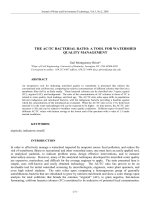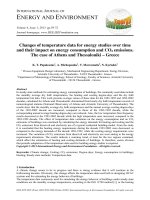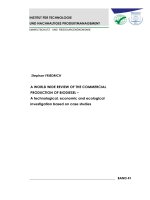- Trang chủ >>
- Khoa Học Tự Nhiên >>
- Vật lý
a world for us the case for phenomenalistic idealism dec 2008
Bạn đang xem bản rút gọn của tài liệu. Xem và tải ngay bản đầy đủ của tài liệu tại đây (979.7 KB, 265 trang )
A WORLD FOR US
This page intentionally left blank
AWorldforUs
The Case for Phenomenalistic Idealism
JOHN FOSTER
1
1
Great Clarendon Street, Oxford
Oxford University Press is a department of the University of Oxford.
It furthers the University’s objective of excellence in research, scholarship,
and education by publis h ing worldwide in
Oxford New York
Auckland Cape Town Dar es Salaam Hong Kong Karachi
Kuala Lumpur Madrid Melbourne Mexico City Nairobi
New Delhi Shanghai Taipei Toronto
With offices in
Argentina Austria Brazil Chile Czech Republic France Greece
Guatemala Hungary Italy Japan Poland Portugal Singapore
South Korea Switzerland Thailand Turkey Ukraine Vietnam
Oxford is a registered trade mark of Oxford University Press
in the UK and in certain other countries
Published in the United States
by Oxford University Press Inc., New York
John Foster 2008
The moral rights of the author have been asserted
Database right Oxford University Press (maker)
First published 2008
All rights reserved. No part of this publication may be reproduced,
stored in a retrieval system, or transmitted, in any form or by any means,
without the prior permission in writing of Oxford University Press,
or as expressly permitted by law, or under terms agreed with the appropriate
reprographics rights organization. Enquiries concerning reproduction
outside the scope of the above should be sent to the Rights Department,
Oxford University Press, at the address above
You must not circulate this book in any other binding or cover
and you must impose the same condition on any acquirer
British Library Cataloguing in Publication Data
Data available
Library of Congress Cataloging in Publication Data
Foster, John, 1941 May 5-
A world for us: the case for phenomenalistic idealism/John Foster.
p. cm.
Includes index.
ISBN 978–0–19–929713–9
1. Idealism. 2. Realism. 3. Phenomenology. I. Title.
B823.F675 2008
141—dc22
2008001087
Typeset by Laserwords Private Limited, Chennai, India
Printed in Great Britain
on acid-free paper by
Biddles Ltd., King’s Lynn, Norfolk
ISBN 978–0–19–929713–9
13579108642
To
George Berkeley
This page intentionally left blank
Preface
Put at its simplest, the aim of this work is to establish that the existence of the
physical world is logically sustained by the world-suggestive way in which,
under God’s ordinance and authority, things are disposed to appear at the
human empirical viewpoint. This idealist thesis—a version of what I speak
of as phenomenalistic idealism—stands in sharp contrast to the commonly
accepted realist view, which takes the world to have an existence that is both
logically independent of the human mind and metaphysically fundamental.
I argue that it is only by accepting the idealist thesis that we can represent the
physical world as having the empirical immanence it needs if it is to form a
world for us.
A world whose existence is logically sustained by how things are disposed
to appear at the human empirical viewpoint sounds as if it would be, at best, a
virtual reality—a mere experiential simulation of a w orld. But in the idealism
for which I argue what logically sustains the existence of the world is not the
world-suggestive system of appearance on its own, but this system as ordained
and authorized by God, and I see this as making a crucial difference. The
God in question is the God of the Judaeo-Christian tradition, and I conceive
of him as having the full perfection of nature that this tradition accords him.
The framework in which I hold this conception is one which represents
God as a personal being—as a rational mental subject—and so as an entity
of the same general category as ourselves. In particular, within the context of
my argument, I take God to be a being who has knowledge and purposes, and
who brings things about by the exercise of his will. All this, I am confident, is
in line with what most ordinary Judaeo-Christian believers implicitly accept.
At the same time, I realize that some philosophers and theologians will find
the approach unacceptably crude. They may say, for instance, that while God
is indeed a being, the sort of being he is cannot be positively specified in
any terms that we can understand. Or they may say that God should not be
thought of as a being (as an entity among entities), but simply as being itself,
or perhaps as active being. Or again, they may insist that the ontological nature
of God is beyond our comprehension altogether. In one way or another,
these philosophers and theologians will think that my representation of God
as a personal being detracts from his essential mystery, and thereby from the
viii Preface
perfection and unsurpassable greatness that the Judaeo-Christian tradition
ascribes to him. I do not discuss these delicate issues in the text of the book,
nor shall I try to do so here. I am happy to acknowledge that the conception
of God I employ might turn out to be in certain respects too crude, and stand
in need of modification. But if it does, this will not, in the end, undermine the
force of my argument. Provided that the modification does not prevent me
from being able to think of God as ultimately responsible, and in some way
purposively responsible, for the way in which things are disposed to present
themselves at the human empirical viewpoint, the role that God is required
to play in my idealist account will not be affected. And a conception of God
that did not allow me to assign such responsibility to him would not preserve
traditional theism in any recognizable sense.
Some readers will be aware that this is not the first book I have written
which is devoted to a defence of phenomenalistic idealism. There are two
reasons why The Case for Idealism, published in 1982, does not make
the present work redundant. The first is simply that while the new book
preserves a significant resemblance to the earlier one, it also includes extensive
changes—changes in the topics covered, in the nature of the idealist thesis I
endorse, in the arguments I develop in order to establish this thesis, and in
the objections to it that I consider and try to meet. Someone who has read
and understood the earlier book should not, on reading the present one, feel
that he has travelled this route before. The second reason is that the whole
style of the new book is, I hope, much more accessible than the first: wherever
possible, I have avoided technicalities, and quite generally I have done my
utmost to make a complex and difficult topic clear and comprehensible. The
technical precision of TheCaseforIdealismmay have a certain virtue in
the abstract, but it made enormous, and arguably intolerable, demands on
the patience of the reader.
In writing the present book I have had to work more or less on my
own, partly as a result of serious ill health, partly because it is hard to find
philosophers who work in this area. So I have not on the whole been able
to gain the benefit of friendly criticism and advice. A notable exception is
provided by the many discussions I have had over the years with Howard
Robinson. He has helped me greatly to clarify and refine my thinking about
a number of issues that feature in the work, and I would like to record my
thanks to him here.
There is one other philosopher I need to acknowledge, and in a sense thank:
George Berkeley, the originator of phenomenalistic idealism as I conceive of
Preface ix
it. Berkeley’s version of this idealism is not entirely to my liking. In particular,
he has what is, from my standpoint, an impoverished view of the sorts of
entity and property that the idealistic world can contain. Sometimes, too, he
seems to stray from the path of anything I would count as idealism at all.
But it is to his vision of a world that is created by the orderly way in which
God brings about our sensory experiences that my own approach can be
ultimately traced. Although I do not discuss Berkeley’s idealism in any detail,
in dedicating this book to him I am signalling my considerable debt to that
vision.
John Foster
Brasenose College, Oxford
This page intentionally left blank
Contents
1. The Problem of Perception 1
2. The Inscrutability of Intrinsic Content 42
3. Realism and Phenomenalistic Idealism 83
4. The Refutation of Realism 123
5. The Challenge of Nihilism 164
6. The Issue of Objectivity 199
Bibliography 247
Index 249
This page intentionally left blank
1
The Problem of Perception
I
We ordinarily take it for granted that we have perceptual access to the physical
world, and that through it we acquire our information about the world and
our situation within it. But how should this perceptual access be understood?
What is it for someone (a human subject) to perceive (perceive by his senses)
a physical item? There are a number of specific theories of the nature of such
perception, but we can classify them all under two rival general views. It is
on these rival views, and the issue between them, that I want, in this opening
phase of the discussion, to focus. I shall do so, initially, within the framework
of the common-sense assumption that the physical world is ontologically
independent of the human mind—that it is something whose existence is
logically independent of facts about human mentality. The adoption of this
framework may seem hardly worth mentioning. How could the world of
space and material objects be anything other than mind-independent? But
what I shall try to show is that, although the two rival views exhaust the range
of possibilities, or at least do so for any given case of perception, neither of
them can be made to yield a satisfactory account so long as the assumption of
mind independence is retained. It is this that creates what I see as the problem
of perception.
Much of what I shall say, in elaborating this problem, draws on points that
I have developed in more detail in my book The Nature of Perception.¹
II
Before I can state the rival views, I need to introduce and explain a key concept.
The concept is of something I call constitution, and it will play a major role not
¹ John Foster, The Nature of Perception (Oxford: Oxford University Press, 2000).
2 AWorldforUs
only in the present context, where we are focusing on the topic of perception,
but also throughout the rest of the discussion. Indeed, the central topic of
the whole discussion concerns a certain thesis of constitution—a thesis about
what constitutively sustains the existence of the physical world.
Constitution, in the sense I intend, is a two-place relation that holds within
the domain of facts (instances of what is the case) and sets of facts. It can be
provisionally defined as follows:
AfactFisconstituted by afactF
, or by a set of facts S, if and only if two
conditions are satisfied, namely:
(1) The obtaining of F is logically due to the obtaining of F
(the obtaining
of the members of S).
(2) The obtaining of F involves nothing over and above the obtaining of
F
(the obtaining of the members of S).
When I speak here of the obtaining of a fact, I do not mean to refer to the
higher-order fact that the relevant fact obtains. I only mean to refer to the
fact itself, but in a way that conveys its nature as an instance of what is
the case. So, when I speak of the obtaining of a fact F as logically due to (or
as involving nothing over and above) the obtaining of a fact F
,thisisjust
another way of saying that, if F is the fact that p, and if F
is the fact that q,
its being the case that p is logically due to (involves nothing over and above)
its being the case that q.
Thus defined, constitution comes in two forms: a single-fact form, in
which a fact is constituted by another (single) fact, and a multi-fact form, in
which a fact is constituted by a set of two or more facts. Strictly speaking, the
definition also allows for the case of a fact being constituted by a set containing
just one fact. But this case can be ignored, since to speak of constitution by
the one-membered set {F
} is just a contorted way of speaking of constitution
by its sole member F
. Where a fact is constituted by a set of facts (a set of
two or more facts), I shall also often speak of it as constituted by the facts
themselves, as a collective plurality. And, to emphasize the plural nature of
what is doing the constituting, I shall sometimes speak of the constituted
fact as breaking down,ordecomposing, into these facts. Any case of multi-fact
constitution can, of course, be recast as a case of single-fact constitution, by
simply replacing the relevant set of facts by a fact that conjoins its members;
or, at least, this can be done if the number of its members is finite. But all this
shows is that a case of single-fact constitution is only interestingly single-fact
if the constitutive fact in question is not a conjunctive one.
The Problem of Perception 3
I have described the definition above as provisional. This is because it
will need to be slightly revised if it is precisely to capture the concept of
constitution I have in mind. But before we can appreciate the need for this
revision, we have to get clear about the nature of the definition in its present
form, and the content of the two conditions for constitution that it prescribes.
One thing which each of these conditions is to be understood as implying
is that the obtaining of F
(the members of S) logically necessitates (logically
ensures, guarantees, suffices for) the obtaining of F. So, in the single-fact
case, if F is the fact that p, and if F
isthefactthatq,eachoftheconditions
implies that it is logically necessary that if q, then p; and in the multi-fact
case, if F is the fact that p, and if S is the set of facts that q
1
, that q
2
,…,
each of the conditions implies that it is logically necessary that if q
1
,q
2
,…,
then p. By ‘logical’ necessity, I mean, as is standardly meant, strict or absolute
necessity: it is logically necessary that p if and only if there is no possible
world of any sort—not even a world with different natural laws—in which
it is not the case that p. As Kripke reminded the philosophical world, it is
important not to confuse the question of what holds as a logical necessity
in this sense with the question of what can be established a priori. We need
empirical evidence to establish that water, as ordinarily conceived, is the same
substance as H
2
O, as chemically defined. But granted that water and H
2
O
are the same substance, the fact of their identity is logically necessary in the
relevant sense, since, if A is the substance water, and B the substance H
2
O,
there is no possible world of any sort in which A and B are numerically
different.
Each of the conditions (1) and (2) is to be understood as implying that the
obtaining of F
(the members of S) logically necessitates the obtaining of F.
But there are two respects in which such necessitation does not, on its own,
suffice for constitution, as I am conceiving of it, and it is these respects which
bring to light the further implications of the two conditions.
In the first place, logical necessitation is not, as such, asymmetric. There are
cases in which the obtaining of a fact, or set of facts, logically necessitates the
obtaining of a fact, or set of facts, and vice versa. The obvious example is that
in which the first fact, or set of facts, and the second fact, or set of facts, are
the same, since, trivially, the obtaining of any fact logically necessitates itself.
In contrast with this, I want the relation of constitution to be necessarily
asymmetric: I want the relation to be such that, where a fact F is constituted
by a fact F
(or a set of facts S), F derives its obtaining from (owes its obtaining
to) the obtaining of F
(themembersofS)inawaythat—onpain,asit
4 AWorldforUs
were, of metaphysical circularity—precludes the same relationship holding
in reverse. It is this element of asymmetric dependence which, in addition
to mere logical necessitation, is expressed by saying, in condition (1), that
the obtaining of F is logically due to the obtaining of F
(the obtaining of the
members of S).
Second, there are cases where one fact is logically necessitated by another
fact or set of facts, but where its obtaining has, as it were, an ontological
life of its own, that lies outside the obtaining of the fact or set of facts that
necessitates it. For example, suppose that, at a certain time t
1
, God prescribes
that a certain kind of event will occur at the later time t
2
,andletF1bethefact
that God issues this prescription at t
1
, and let F2 be the fact that the relevant
kind of event occurs at t
2
. Granted that God is (in some relevant sense)
omnipotent, and is so essentially, the obtaining of F1 logically necessitates
the obtaining of F2; but, given that the prescription and the subsequent
event are ontologically discrete items, that occur at different times, there is
a clear sense in which the obtaining of F2 (its being the case that an event
of the relevant kind occurs at t
2
) is something separate from—something
genuinely additional to—the obtaining of F1 (its being the case that God
issues the relevant prescription at t
1
). Now I want the relation of constitution
to exclude this kind of separateness: I want things to be such that, where a fact
is constituted by another fact or set of facts, its obtaining is wholly included
in the obtaining of this other fact or set of facts. And it is this inclusion that is
expressed by saying, in condition (2), that the obtaining of F involves nothing
over and above the obtaining of F
(the obtaining of the members of S).
Examples of constitution, in the sense defined, are not hard to find. One
clear-cut range of single-fact cases is marked out by the principle that the
instantiation of a generic (determinable) property is always constituted by
the instantiation of a property that is more specific (more determinate). For
instance, if an object is (generically) red, the fact of its being so is constituted,
in the relevant sense, by a more specific fact about its colour, such as its being
scarlet or carmine: the obtaining of the generic colour fact is logically due
to, and involves nothing over and above, the obtaining of the specific fact.
A clear-cut range of multi-fact cases is provided by the relationship between
one object’s being heavier than another and their individual weights. Thus,
if John weighs twelve stone and Mary weighs ten stone, the fact that John
is heavier than Mary is constituted by the combination of the facts that
John weighs twelve stone and that Mary weighs ten stone: the obtaining of
their weight relationship is logically due to, and involves nothing over and
The Problem of Perception 5
above, the obtaining of these separate weight facts about them. These are
clear-cut cases in the sense that the relevant claims of constitution are wholly
uncontroversial: no one will think of denying that, in the kinds of situation
envisaged, the two prescribed conditions for constitution are satisfied in the
specified ways. Not surprisingly, the claims of constitution on which we shall
be focusing in our philosophical discussion will not be uncontroversial in
that way.
I have already indicated that the present definition of constitution will
need to be slightly revised. The point of the revision is to allow for cases in
which the obtaining of a fact has two independent modes of constitution.
To focus on a simple example, let us, again, suppose that John weighs twelve
stone and Mary weighs ten stone. We can draw up the following list of facts
whose obtaining is implicit in this supposition:
F1: the fact that John weighs twelve stone.
F2: the fact that Mary weighs ten stone.
F3: the fact that either John weighs twelve stone or 2 + 2 = 5.
F4: the fact that either Mary weighs ten stone or 2 + 2 = 5.
F5: the fact that either John weighs twelve stone or Mary weighs ten stone.
Whenever it is true that p and false that q, the obtaining of the fact that p
or q is logically due to, and involves nothing over and above, the obtaining
of the fact that p. So, the obtaining of F3 is logically due to, and involves
nothing over and above, the obtaining of F1, and the obtaining of F4 is
logically due to, and involves nothing over and above, the obtaining of F2.
This means that F3 is constituted by F1 and that F4 is constituted by F2. But
now consider how F5 stands to F1 and F2. Granted that F3 is constituted
by F1, we want to be able to say that F5, too, is constituted by F1, since
the obtaining of F1 bears on the obtaining of F3 and on the obtaining of F5
in exactly the same way. Similarly, granted that F4 is constituted by F2, we
want to be able to say that F5, too, is constituted by F2, since the obtaining
of F2 bears on the obtaining of F4 and on the obtaining of F5 in exactly
the same way. But these are not things that we are able to say under our
present definition of constitution. Given that it is logically necessitated by
the obtaining of F2, we cannot say, without qualification, that the obtaining
of F5 is logically due to, or involves nothing over and above, the obtaining
of F1; and, given that it is logically necessitated by the obtaining of F1, we
cannot say, without qualification, that the obtaining of F5 is logically due to,
or involves nothing over and above, the obtaining of F2. All we can say is
6 AWorldforUs
that, with respect to its necessitation by F1, the obtaining of F5 is logically due
to, and involves nothing over and above, the obtaining of F1, and that, with
respect to its necessitation by F2, the obtaining of F5 is logically due to, and
involves nothing over and above, the obtaining of F2.
The solution is to reformulate the two conditions for constitution in a
way that relativizes what they claim to the context of a single source of
necessitation. So, the revised definition of constitution will read:
AfactFisconstituted by afactF
,orbyasetoffactsS,ifandonlyifthe
obtaining of F is logically necessitated by the obtaining of F
(the obtaining
of the members of S), and, with respect to that source of necessitation:
(1) the obtaining of F is logically due to the obtaining of F
(the obtaining
of the members of S);
(2) the obtaining of F involves nothing over and above the obtaining of
F
(the obtaining of the members of S).
This will allow us to say that F5 is separately constituted by both F1 and F2;
and it will accommodate a w hole range of cases of a similar kind, in which a
single fact has two or more independent modes of constitution.
Although the new definition is needed for the purposes of precision, the
issue of independent modes of constitution will not be relevant to the topics of
our future discussion, and in what follows I shall normally, for convenience,
continue to express the conditions for constitution in their simpler original
form, without relativizing their content to a source of necessitation.
III
With the concept of constitution in place, we must now turn to the topic
of physical-item perception, and the two rival general views about its nature.
In setting out and discussing these views, I shall work on the assumption
that we can think of human subjects as perceiving items at points (moments)
of time, with zero temporal extent. This assumption does not imply, what
would clearly be incorrect, that a momentary instance of perceiving can
occur in isolation, without being contained within an extended episode of
perceiving, and once that point is understood, the assumption may not
seem unreasonable. But, in any case, my reason for adopting it is more
one of expositional convenience than philosophical conviction; and certainly
nothing of substance will turn on it. If anyone objects to the assumption,
The Problem of Perception 7
on the grounds that any genuine instance of perceiving must be temporally
extended, I am happy for him to read what I say with the adjustments that his
position requires. To harmonize with my recognition of momentary instances
of perceiving, I shall also recognize certain kinds of momentary physical item
to serve as objects, or potential objects, of perception. In particular, among
such objects, I shall recognize the momentary stages of persisting physical
items, where each such stage is something whose existence covers all and only
what is covered by the existence of the relevant persisting object at a particular
point in time. Anyone who wants to make adjustments to what I say in the
case of momentary instances of perceiving will need to make appropriate
adjustments here, too. Strictly speaking, some of the things that I represent as
momentary stages of persisting items are really entities whose spatial points,
while of zero temporal extent, are spread over a range of moments. But, for
simplicity of exposition, that is something I shall largely ignore.
To enable me to formulate the two rival views clearly and concisely, it will
be helpful if I begin by making terminological provision for certain further
key notions, specific to the topic of perception.
First, given a subject S and two items x and y that he simultaneously
perceives, I shall say that S’s perceiving of x (the fact of his perceiving x) is
mediated by his perceiving of y (the fact of his perceiving y) if and only if
(1) S’s perceiving of x is constituted by the combination of his perceiving of
y and certain additional facts, and (2), apart from any concern they may have
with S’s perceiving of y, these additional facts do not involve anything about
S’s perceptual condition at the relevant time. Where a subject’s perceiving of
one item is mediated, in this way, by his perceiving of another, we can speak
of him as perceiving the second item more immediately than he perceives the
first. I shall illustrate this notion of perceptual mediation presently.
Second, I shall say that a subject S φ-terminally perceives an item x at a
time t if and only if x is a physical item and S perceives x at t and there is
no other physical item y such that S’s perceiving of x a t t is mediated by
his perceiving of y at t. So, the perceiving of an item qualifies as φ-terminal
just in case the item is physical and there is no other physical item that is,
in the context of that perceiving, perceived more immediately. (This leaves
open the possibility of there being a non-physical item that is perceived more
immediately.) I shall take it for granted that physical-item perception is not
infinitely regressive, and that whenever a physical item is perceived, there
is some physical item which is, in respect of that perception, φ-terminally
perceived.
8 AWorldforUs
Finally, when I speak of a psychological state as in itself physically perceptive,
I mean that it is logically impossible for someone to be in that state without
thereby perceiving a physical item, and when I say that a psychological state
is in itself perceptive of an item x, I mean that it is logically impossible for
someone to be in that state without thereby perceiving x. Obviously, I am here
using the term ‘state’ to mean type state, not token state. So, a psychological
state is something that is capable of realization in different subjects and on
different occasions.
The two rival views of perception can now be set out as follows. According
to the first view, whenever someone perceives a physical item, there is some
psychological state which is not in itself physically perceptive, and the fact of
his perceiving that item breaks down into (is constituted by the combination
of) two components. One of these components consists in his being in that
state. The other comprises certain additional facts, but ones that do not
involve anything further about his psychological condition at the relevant
time. In practice, the advocate of this view will take these additional facts
to concern, or concern amongst other things, the qualitative relationship
of the psychological state to the physical item (or to the item φ-terminally
perceived), and the role of the item in causing the subject to be in that state
at that time. I shall call this first view the decompositional view. According to
the second view, whenever someone φ-terminally perceives a physical item,
the fact of his perceiving it is something psychologically fundamental. It is
not something that breaks down into (is constituted by the combination of)
his being in some further psychological state, which is not in itself physically
perceptive, and certain additional facts, not involving anything further about
his current psychological condition. It does not, at the psychological level,
break down into further facts at all, except perhaps (if this is possible) in a
purely trivial way, where the perceived item is something complex and the
subject’s perceiving of it breaks down into the separate perceivings of its parts.
In other words, the psychological state that is fundamentally involved in the
perceiving of the relevant physical item is one that is in itself perceptive of
that item. I shall call this second view the fundamentalist view.²
It is obvious that, for any case of physical-item perception, the two views
are, with respect to the φ-terminal perceiving involved, mutually exclusive:
they are explicitly formulated so as to be so. It is also true, though not
² The decompositional and fundamentalist views coincide with what, in TheNatureofPerception,
I respectively labelled the broad representative theory and strong direct realism,exceptthatthelatter
positions were defined as ones that explicitly endorsed a realist conception of the physical world.
The Problem of Perception 9
guaranteed by their mode of formulation, that the views are, case by case,
jointly exhaustive. For where an item is φ-terminally perceived, the only
way in which we could sensibly think of the psychological state that is
fundamentally involved as failing to be in itself perceptive of that item would
be by thinking of it as failing to be in itself physically perceptive altogether;
and if the state is not in itself physically perceptive, the decompositional
account of the perceiving is the only one available.
We can best bring out the nature of the two views by focusing on a
particular case. Suppose, at a certain time t, Ralph sees an apple on the table
in front of him. His seeing of the apple is mediated, in the sense defined, by his
seeing of a certain portion of its surface (it is constituted by the combination
of his seeing this portion and the fact that this latter item is a portion of
the apple’s surface), and his seeing of this persisting surface portion is, in an
exactly analogous way, mediated by his seeing of a certain momentary stage
of it—a stage which, depending on the precise temporal length of the causal
process from the surface portion to its visual registering at t, occurs slightly
earlier than t.³ This momentary stage of the apple’s surface portion is then
what, in the sense defined, Ralph φ-terminally sees at t—what, relative to the
domain of physical candidates, he most immediately sees. It is in terms of his
visual contact with this φ-terminal object that the two views come into sharp
conflict. Let us call this φ-terminal object O. The fundamentalist will say
that, given that O is the φ-terminal object of perception, Ralph’s seeing of O
is a fundamental aspect of his psychological condition at t: his fundamental
psychological state, though wholly a matter of what is occurring within his
mind at that time, inherently involves his standing in this awareness relation
to this external physical item. In contrast, the decompositionalist will say
that, instead of being psychologically fundamental, the fact of Ralph’s visual
contact with O breaks down into two components. One component will
cover all the relevant aspects of Ralph’s psychological condition at t—all that
obtains or occurs in his mind at that time that in any way logically contributes
to the obtaining of the relevant perceptual fact—and the decompositionalist
will insist that these aspects, on their own, do not secure perceptual contact
with O or suffice for physical-item perception at all. The other component
will cover the remaining facts that are relevant to the securing of visual
contact with O—facts that do not involve anything further about the
³ This is an example of something that I am representing as a momentary stage, but which in
reality, because of the slightly varying length of the causal process from different points on the
surface portion, is spread over a range of moments.
10 AWorldforUs
subject’s psychological condition at t. In practice, decompositionalists will
take the first component to consist in the fact of Ralph’s having a certain
kind of visual experience at t, and will take the second component to consist
in, or centrally involve, facts concerning the qualitative relationship of this
experience to O and the nature of the causal process from O to the occurrence
of the experience. Fundamentalists too will take the seeing of O to involve
the occurrence of a visual experience and will accept that this experience
occurs at the end of a causal process starting from O. But they will take this
experience to be one which, by its intrinsic psychological nature, puts the
subject into perceptual contact with O. They will not think that either the
qualitative relationship of the experience to the external item or the nature of
the causal process from this item to the experience constitutively contributes
to the securing of this contact.⁴
I have said that both decompositionalists and fundamentalists will recognize
the existence of a causal process from the perceived physical item to the visual
experience. But the ways in which they will understand the nature of this
process are very different. For the decompositionalist, the nature of this
process will be, in its general character, relatively straightforward. Light
reflected from O enters Ralph’s eyes, producing a certain pattern of firings in
his optic nerves, which in turn brings about a further complex event in the
relevant part of his brain, which finally results in the occurrence of the visual
experience. At each stage in this process the character of what happens directly
causally depends only on the character of what takes place immediately before
it and the currently prevailing conditions. So the pattern of firings in the optic
nerves directly depends only on the character of the photic input, together
with the relevant facts about the structure and prevailing state of the subject’s
eyes and nervous system; the character of the brain event directly depends
only on the character of the optic-nerve firings, together with the relevant
facts about the structure and prevailing state of the brain; and, crucially, the
character of the visual experience directly depends only on the character of
the brain event and prevailing brain conditions, together with the relevant
facts about the character of the subject’s mind and the form of its cerebral
embodiment. In other words, the causal process works in a standard serial
way, whereby each stage in the process contributes to the final outcome only
insofarasitaffectswhatimmediatelyfollowsit.Butthiscannotbehow
⁴ They could still, of course, think that this psychologically fundamental contact logically could
not have occurred without the experience being qualitatively and/or causally related to O in a
certain way.
The Problem of Perception 11
the fundamentalist will see the causal process. This becomes clear when we
expand the original example to include a second seeing of the apple. Thus,
suppose, after seeing the apple at t, Ralph closes his eyes for a few seconds, and
then, on opening them, has another experience of seeing the apple, this time at
t
.Andletuscalltheφ-terminal object of this t
episode of seeing O
,anitem
which we can assume to be a correspondingly later momentary stage of the
same portion of the apple’s surface. Let us also suppose that the causal process
from O
to brain is of exactly the same kind as that from O to brain, that
the resulting brain events are of exactly the same kind, and that the cerebral
and mental conditions in which these events occur are relevantly the same.
Despite the qualitative identity of these processes, events, and conditions,
the fundamentalist will take the resulting psychological events—the two
visual experiences—to be, and to be at the fundamental level of description,
of different psychological types, since he will say that one of these events
(experiences), by its psychological character alone, puts Ralph into visual
contact with O, and that the other, by its psychological character alone, puts
him into visual contact with O
, a momentary stage that is later than, and
so numerically different from, O. Clearly, then, the fundamentalist cannot,
like the decompositionalist, think that the psychological outcomes in the
two cases directly causally depend only on the character of the brain events
that immediately precede them and the conditions in which these events
occur. Rather, he will have to recognize certain additional factors which, by
combining with these events and conditions, account for why the resulting
outcome is in the one case a seeing of O and in the other case a seeing of O
.
And it is not difficult to see what these factors will be. Obviously, from the
standpoint of the fundamentalist view, what will combine with the relevant
brain event and prevailing conditions to causally ensure a seeing of O at t will
be the whole causal process from O to brain, and, in particular, the role of O
(as distinct from any other physical item) as the initiator of that process; and
what, subsequently, will combine with the relevant brain event and conditions
to causally ensure a seeing of O
at t
will be the whole causal process from O
to brain, and, in particular, the role of O
(as distinct from any other physical
item) as the initiator of that process. So, in each case, the causal process
from the relevant physical item to the brain will play a double causal role
with respect to the psychological outcome, being both what brings about the
relevant brain event immediately preceding that outcome and what combines
with that event, and the other relevant aspects of the prevailing conditions, to
determine the specific perceptive character of the outcome. This may seem,
12 AWorldforUs
at first sight, a strange way for causation to operate—where the nature of
what occurs at a given time is affected not just by what occurs and obtains
immediately prior to that time, but also by the sequence of events leading
up to it. But, on reflection, we can see that this kind of causation is precisely
what fits the distinctive character of the fundamentalist position, in which,
on any perceptual occasion, contact with the φ-terminally perceived item is
taken to be a fundamental aspect of the subject’s psychological condition,
and where that item occurs earlier than the time of the perceiving. Once
it is accepted that the fundamental character of the psychological outcome
incorporates the existence of the perceived item and its perception by the
subject, there is nothing strange about supposing that the process from the
item to the subject’s brain has a direct causal influence on it.
There is one other aspect of the fundamentalist view that needs to be
underlined here. The fundamentalist will insist that the experience of seeing
O and the experience of seeing O
differ in their fundamental psychological
character. But he is not obliged to say that they differ in their subjective
(phenomenological) character—in how they introspectively appear to the
subject, or would appear if properly scrutinized. Indeed, he is likely to
acknowledge that, since the relevant brain events and conditions in the two
cases are of exactly the same type, the chances are that the way in which
O sensibly appears to Ralph at t and the way in which O
sensibly appears
to him at t
will be exactly the same as well, and that, in consequence, the
two visual experiences will be, in terms of their introspective appearance,
indistinguishable. There is nothing paradoxical in this. Once it has been
accepted that the psychological state that is fundamentally involved in any
perception is in itself perceptive of a particular physical item, it is inevitable
that there is an aspect of what is going on psychologically that cannot reveal
itself introspectively.
One reason for underlining this point is that it removes the temptation
to attempt an instant refutation of the fundamentalist view by appeal to
the phenomenon of hallucination—the phenomenon of experiences which
subjectively pose as perceptions of certain kinds of physical item, but are not
physically perceptive at all. Thus, on first encounter, we might have thought
that we could prove the falsity of the view by advancing the following simple
argument:
(1) For any physical-item perception, there could be a subjectively matching
hallucination.









